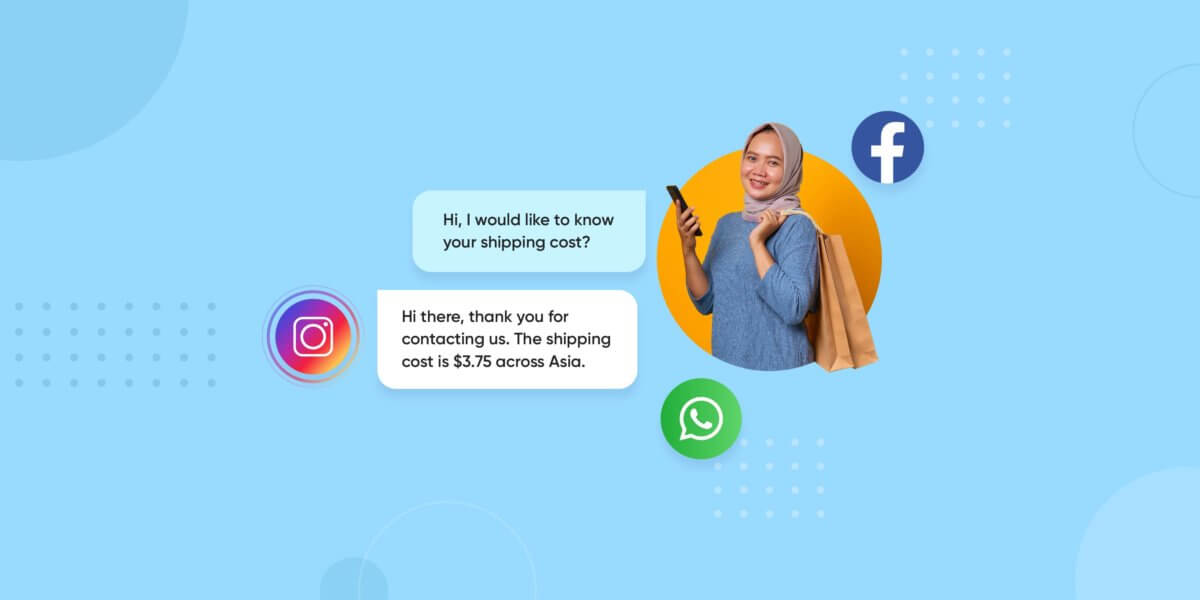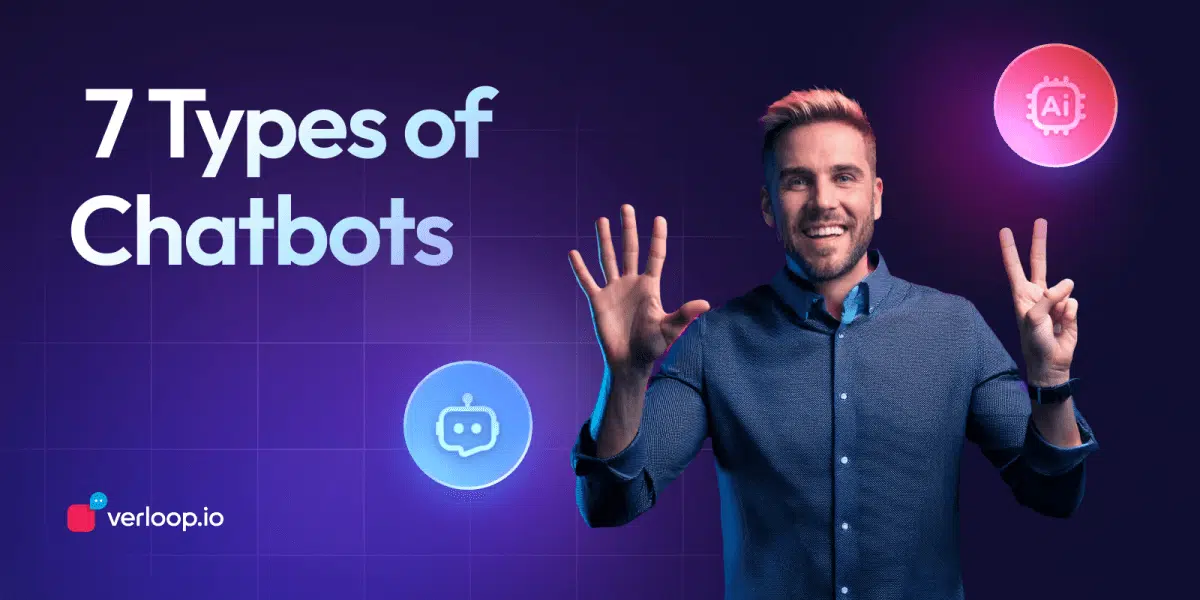
7 Types of Chatbots: Which One’s Best For Your Business?
- April 21st, 2025 / 6 Mins read
-
 Aarti Nair
Aarti Nair
Last month, a retail manager told us how a simple customer question landed in the inbox just after closing time. By morning, that prospect had moved on—no one was there to reply. Have you ever lost a sale because you couldn’t answer quickly?
Or spent extra hours chasing routine queries?
Which chatbot type would have helped in that moment?
There are rule‑based bots, AI‑driven assistants, voice‑enabled agents and more—each designed for specific tasks and goals. Over the next few sections, we’ll explore seven chatbot types and how they can fit into your operations. But first, here’s why it matters:
- The chatbot market is set to grow at 23.3 % annually, reaching $15.5 billion by 2028.
- Today, 87.2 % of consumers rate their interactions with bots as neutral or positive.
- 62 % prefer chatting with digital assistants rather than waiting for a human agent
- Chatbots can automate up to 30 % of tasks in a contact centre—potentially saving U.S. businesses $23 billion.
As you read on, ask yourself: which type will help you respond faster, cut costs and keep customers engaged? Let’s find out.

7 types of chatbots that can help you build and scale your operations
AI automation, by far, has only reaped tangible results for businesses from different industries like reducing the cost of support operations, improving customer satisfaction and delivering a 24/7 mode of communication for your customers. Here are 7 types of chatbots you can use to automate, streamline, and scale your business.
1. Menu-based chatbots
This is usually any business’ initial pick if they are looking to implement basic, first-line automation in their company. These chatbots work on a simple button-based rule, where the user is presented with a defined set of responses to choose from.
The conversation design is scripted and follows a set pattern. It is usually created to solve specific business use cases.
For example, an eCommerce company can deploy a menu-based chatbot to assist users after a product is delivered with set menu options. It would look something like –
Hi! Thanks for visiting our store. Please choose from the options below to continue.
- Return a product
- Exchange a product
- File for a refund
- Give feedback
These chatbots work the best to answer most of your L1 questions – your FAQs.
Suggested Reading: Top 10 Industries That Uses Chatbots

2. Keyword-driven chatbots
While your menu-based chatbots help you solve most of your recurring queries with a simple chat flow, a keyword-driven bot goes a step up. These types of chatbots are trained to identify and get triggered by “certain keywords”. These defined keywords, when mentioned by the user in their query, are picked up by the bot which then attempts to provide a relevant response based on it.
For example, a user might type in “I need to know the status of my refund” in the chat box. A keyword-driven chatbot will immediately pick up “status” and “refund” from the query to identify the user query. It will then respond with further relevant questions like “Please provide me with your refund ID”

3. AI chatbots
Want to level up from keyword-driven bots? Blend artificial intelligence into your digital ecosystem.
AI-powered chatbots are emerging as the smartest, self-reliant solution to several communication needs of businesses today. Whether built for internal communication or to serve your external stakeholders like your beloved customers, AI chatbots use an amalgamation of several technologies to function.
Natural Language Processing and Understanding (NLP/NLU) and machine learning (ML) allow these chatbots to render natural user conversations. Building an AI chatbot from scratch takes more time and resources since the process can be a bit complicated. However, a chatbot solution like, for example, Verloop.io, comes equipped with extensive industry-based training datasets for a business to build and polish its AI chatbot.
These types of chatbots are largely independent, and allow users to self-serve most of their concerns, before any agent intervention is needed. You can train these chatbots to converse in multiple languages to support the lingual preferences of your target audience. They are self-evolving, meaning they learn and adapt their course based on past interactions.
AI also helps these chatbots stay relevant and contextually intelligent. They are able to map the user’s intent, tone, and emotion – all through textual inputs to respond appropriately. Read: Five ways to make your chatbot more contextually aware.
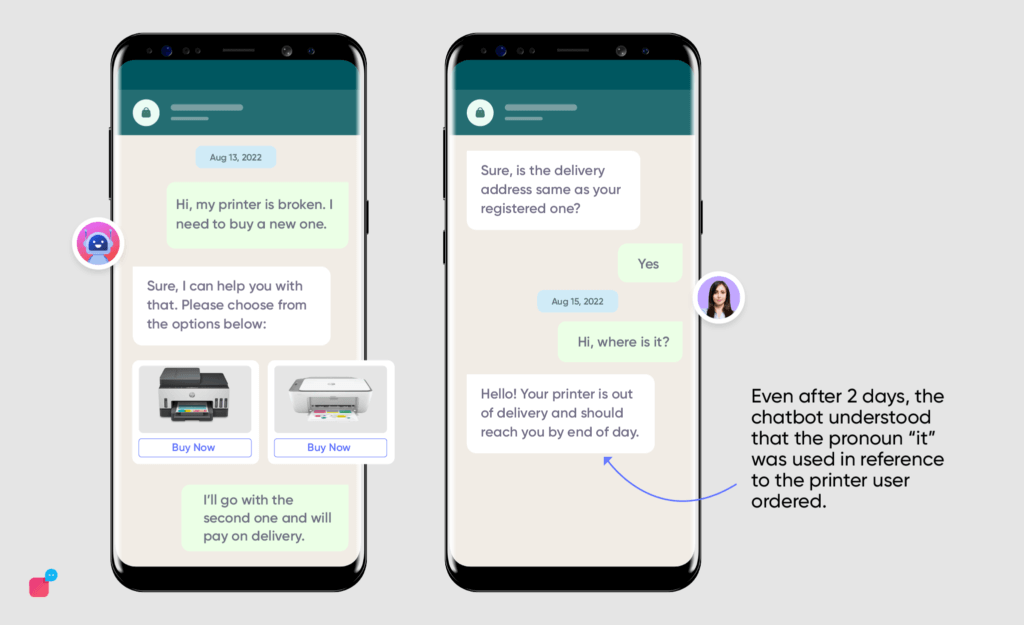
4. Hybrid chatbots
Want the best of both worlds? Go hybrid.
Hybrid chatbots bring in the simplicity of rule-based bots and AI’s ability to simplify complexity. These types of chatbots can solve linear use cases and answer FAQs seamlessly. Whereas, it can also display empathy, intelligence, and nuance in its approach – which is typical of a highly developed AI.
What’s more? Hybrid chatbots are also smart enough to know when to intelligently route a query/ticket to a live agent. For example, if a user types in ? as a response, an intelligent hybrid bot would pick up a tone of dissatisfaction/unhappiness from it and assume that it’s probably for the best for a human agent to take over the chat to offer a more customised, apt resolution.
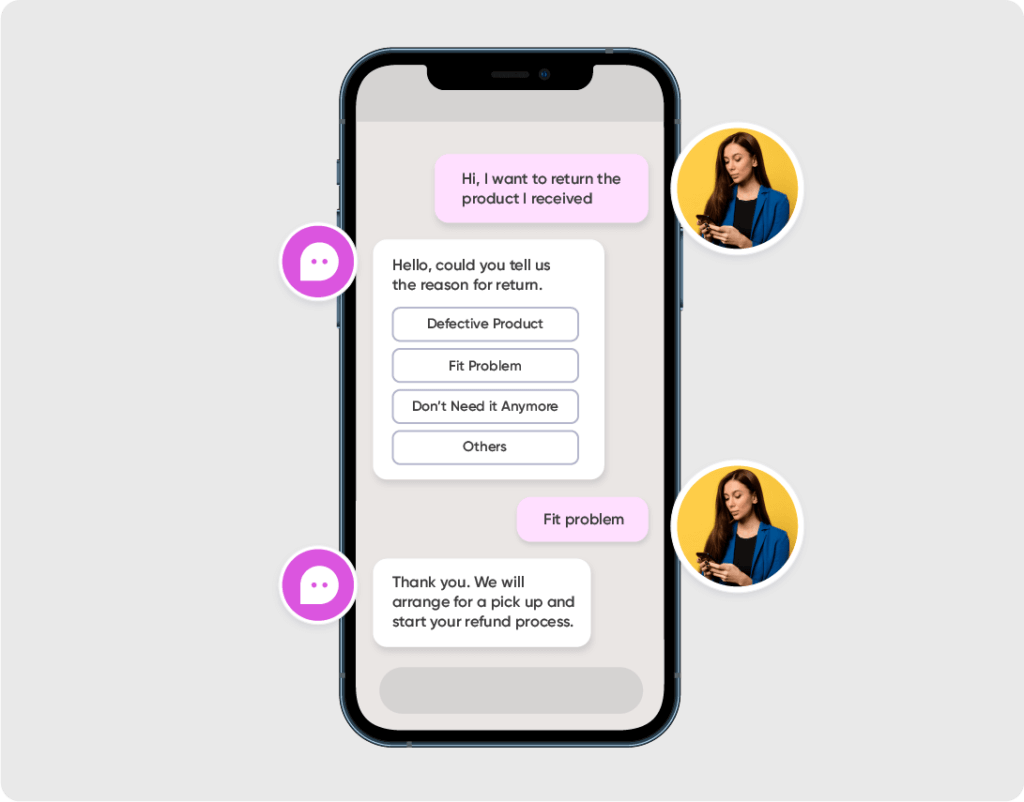
5. FAQ ML Chatbots
These bots learn from your existing FAQ pages, knowledge bases or support tickets to match incoming questions with the most relevant answer. They work best when you have a clear set of recurring queries: order statuses, return policies or product specifications. By automating up to 80 % of simple enquiries, they free your team for more complex issues.
-
Have you ever seen the same question pop up in every chat session? An FAQ ML bot can tackle it instantly.
-
They require minimal training—just upload your FAQs and let the model do the rest.
-
As your library of questions grows, they improve accuracy without extra coding.
6. Generative AI Agents
These assistants draft responses on the fly, combining your brand voice with up‑to‑date information. Rather than selecting from prewritten replies, they can craft explanations, summarise content or guide a customer through multi‑step processes.
-
Need to help a customer build a product bundle, troubleshoot a new feature or write a customised proposal? A generative agent can walk them through.
-
They integrate with your databases or CRMs to pull in order details, pricing or policy changes in real time.
-
You decide where to set guardrails: allow full creativity or limit them to a defined knowledge set.
7. Voice.AI Bots
Imagine those same capabilities over the phone. Voice.AI bots handle spoken requests, recognise intent and reply with natural‑sounding speech. They slot into your IVR system to answer common questions or route calls more intelligently.
-
What if callers didn’t need to wait in a queue just to check their balance or change a booking?
-
These bots reduce average call handling time and lower your human agent workload.
-
They also capture sentiment cues—like frustration in a raised tone—to trigger human takeover when it matters most.
Which chatbot is right for your business?
The answer to this is that it’s highly subjective.
A rule-based chatbot, all in all, takes less time, effort, planning, and deployment costs. With the limited scope of functionality, scripted chatbots are best at resolving common queries. So, if you have a rather small business with a few hundred clients, a rule-based chatbot should do the trick without demanding too much from you.
Whereas, if you are looking to scale up or a company with an established name and big customer base, investing in AI technology should suit you the best. A conversational AI solution like Verloop.io can help you get started with a chatbot for your customer support in no time. Know how to build one below!
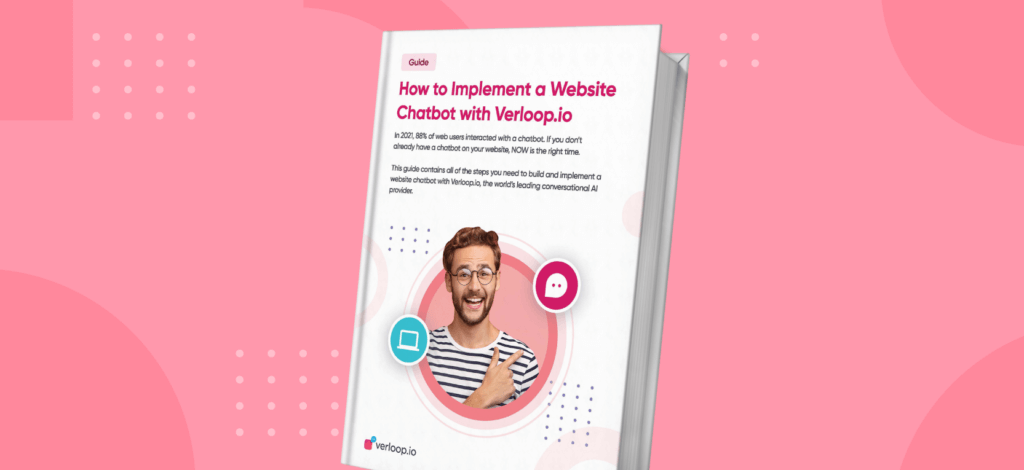
FAQs
1. What is a Level 3 chatbot?
A Level 3 chatbot uses natural language processing (NLP) to understand user intent and maintain simple context across turns. Unlike basic rule‑based bots (Levels 1–2), it can follow a short dialogue, remember details within a session (for example, a user’s name or order number) and adjust its responses accordingly.
2. What is the classification of a chatbot?
Chatbots are often classified by:
-
Technique: rule‑based versus AI‑driven (machine learning or generative AI).
-
Channel: text‑only versus voice‑enabled.
-
Purpose: informational (FAQs), transactional (booking, ordering) or conversational (virtual assistants).
3. What is a chatbot and its types (Class 10 level)?
A chatbot is a software programme that simulates conversation with users. The main types are:
-
Rule‑based: follow a fixed decision tree of “if–then” rules.
-
FAQ ML: match questions to existing answers using machine learning.
-
Generative AI: compose new responses in real time.
-
Voice.AI: interact by spoken word rather than text.
4. What are the two main types of chatbots?
The two broad categories are:
-
Rule‑based bots – operate on predefined scripts and keyword matching.
-
AI‑based bots – use machine learning or generative models to understand and create language.
5. What is NLP?
Natural Language Processing (NLP) is a branch of AI that enables computers to interpret, understand and generate human language. It covers tasks such as intent detection, entity recognition and sentiment analysis.
6. What is ML?
Machine Learning (ML) is a subset of AI where systems learn patterns from data rather than follow explicit rules. Chatbots with ML improve over time as they process more examples of user interactions.
7. What is Generative AI?
Generative AI refers to models (like large language models) that create new content—text, images or audio—based on learned patterns. In chatbots, generative AI agents draft customised replies rather than selecting from a fixed list.





